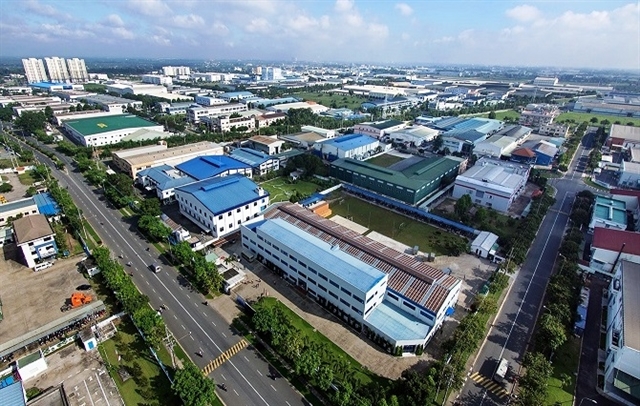
Viet Nam's GDP growth for the year has been readjusted to 4.8 per cent, a 0.2 per cent decrease compared to an earlier forecast made back in December 2020, said a World Bank report released on Tuesday.
Viet Nam's GDP growth for the year has been readjusted to 4.8 per cent, a 0.2 per cent decrease compared to an earlier forecast made back in December 2020, said a World Bank report released on Tuesday.
According to the report, the country has been showing strong resilience during the pandemic with GDP growth for the first half of 2021 nearing pre-pandemic levels, with the industrial sector leading the charge on top of robust consumption and investment.
 |
| An industrial park in southern Dong Nai province. Viet Nam's economy has been said to experience a slowdown since the fourth outbreak of the novel coronavirus in late April this year. |
The readjustment, however, reflected how the social distancing measures and mobility restrictions, which have been put in place since the fourth outbreak of the virus (since late April) have affected economic activities.
Economic activities have seen drops with Purchasing Manager’s Index dropping below 50 per cent and retail sales in July falling by as much as 19.8 per cent, the largest drop since April last year. Unemployment has been forecast to rise in the near future with households and the informal sector bearing the brunt of the economic slowdown.
The report suggested a number of measures the government can adopt to mitigate the impact of the outbreak including improvements to social protection programmes, risk control in the financial sector and finding the right balance between the need to support the recovery of the economy and the necessity to maintain a sustainable level of public debt.
"While downside risks have heightened, economic fundamentals remain solid in Viet Nam, and the economy could converge toward the pre-pandemic GDP growth rate of 6.5 to 7 per cent from 2022 onwards,” said World Bank Acting Country Director of Việt Nam Rahul Kitchlu.
“Whether Viet Nam’s economy will rebound in the second half of 2021 will depend on the control of the current COVID-19 outbreak, the effective vaccine rollout, and the efficiency of the fiscal measures to support affected businesses and households, and to stimulate the recovery,” he said.
While FDI inflows decreased because of the COVID-19 shock, they have proven resilient compared to the rest of the world, suggesting continued confidence in Viet Nam’s economic potential. In the first half of 2021, total FDI commitments contracted by 2.6 per cent compared to the same period last year, reaching US$15.3 billion.
Yet, the level of commitment declined by 45 per cent between April and June, which may indicate further prudence by foreign investors amid the recent COVID-19 outbreak.
FDI inflows, however, may experience a slowdown as investors have become more prudent since the beginning of the fourth outbreak, said Hoang Anh Tu, Deputy Head of the Department of International Relations under the Ministry of Information and Communication.
"We have seen strong FDI numbers going into the country, especially in tech fields. The pandemic, in a sense, has helped speed up the pace of the country's digitalisation process," he said.
Digital path
The report also raised a number of points regarding the Southeast Asian economy's effort to speed up its digitalisation process, a focal point of the country's 2021–2030 National Development Strategy.
"As the world emerges from the COVID-19 crisis, it has become clear that digital transformation will have an increasingly important role in the global economy," wrote the report.
While Viet Nam today is among some of the most connected in the world with high mobile and internet penetration rates, increasing use of IT tools and platforms by businesses it also suffers from a lack of skilled IT workers, inadequate financing, lack of conducive regulatory environment including data access and security.
The WB report advised the Government to divide its attention between building infrastructure, encouraging technology adoption and attracting investment to help small businesses participate in the digital economy. Measures must also be taken to support faster learning, data privacy and cybersecurity.
(Source: VNS)





